《中考英语》初中英语语法知识—情态动词的分类汇编
初中情态动词知识点归纳
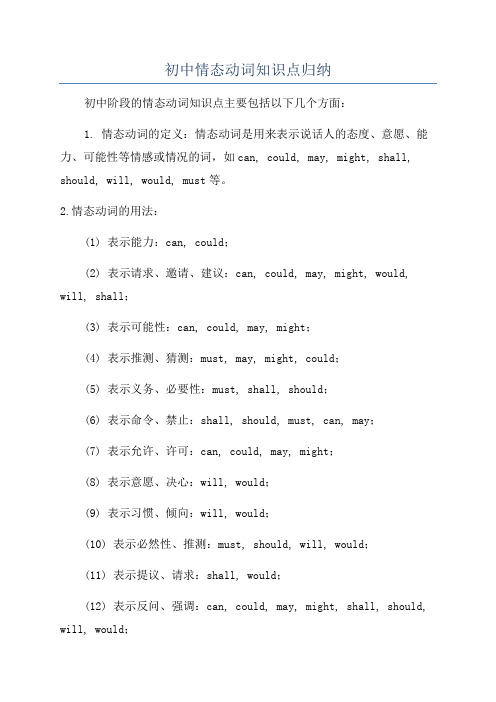
初中情态动词知识点归纳初中阶段的情态动词知识点主要包括以下几个方面:1. 情态动词的定义:情态动词是用来表示说话人的态度、意愿、能力、可能性等情感或情况的词,如can, could, may, might, shall, should, will, would, must等。
2.情态动词的用法:(1) 表示能力:can, could;(2) 表示请求、邀请、建议:can, could, may, might, would, will, shall;(3) 表示可能性:can, could, may, might;(4) 表示推测、猜测:must, may, might, could;(5) 表示义务、必要性:must, shall, should;(6) 表示命令、禁止:shall, should, must, can, may;(7) 表示允许、许可:can, could, may, might;(8) 表示意愿、决心:will, would;(9) 表示习惯、倾向:will, would;(10) 表示必然性、推测:must, should, will, would;(11) 表示提议、请求:shall, would;(12) 表示反问、强调:can, could, may, might, shall, should, will, would;(13) 表示承诺、保证:will, would;(14) 表示否定:can't, couldn't, may not, mustn't, shouldn't, won't, wouldn't。
3.情态动词的句型:(1) 能力句型:主语 + can/could + 动词原形;(2) 请求句型:主语 + can/could/may + 动词原形 + 其他;(3) 建议句型:主语 + should + 动词原形;(4) 命令句型:主语 + must/should + 动词原形 + 其他;(5) 允许句型:主语 + can/could/may + 动词原形 + 其他;(6) 必要性句型:主语 + must/should + 动词原形;(7) 意愿句型:主语 + will/would + 动词原形;(8) 可能性句型:主语 + can/could/may/might + 动词原形;(9) 推测句型:主语 + must/may/might + 动词原形;(10) 禁止句型:主语 + mustn't/shouldn't + 动词原形。
初中英语知识点归纳情态动词的用法
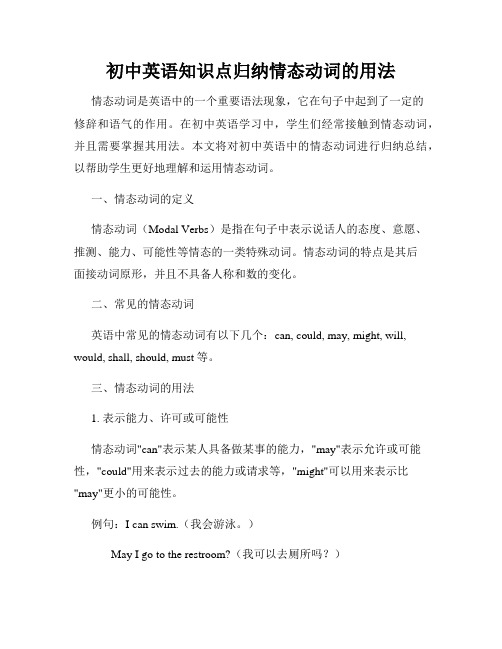
初中英语知识点归纳情态动词的用法情态动词是英语中的一个重要语法现象,它在句子中起到了一定的修辞和语气的作用。
在初中英语学习中,学生们经常接触到情态动词,并且需要掌握其用法。
本文将对初中英语中的情态动词进行归纳总结,以帮助学生更好地理解和运用情态动词。
一、情态动词的定义情态动词(Modal Verbs)是指在句子中表示说话人的态度、意愿、推测、能力、可能性等情态的一类特殊动词。
情态动词的特点是其后面接动词原形,并且不具备人称和数的变化。
二、常见的情态动词英语中常见的情态动词有以下几个:can, could, may, might, will, would, shall, should, must等。
三、情态动词的用法1. 表示能力、许可或可能性情态动词"can"表示某人具备做某事的能力,"may"表示允许或可能性,"could"用来表示过去的能力或请求等,"might"可以用来表示比"may"更小的可能性。
例句:I can swim.(我会游泳。
)May I go to the restroom?(我可以去厕所吗?)Could you please open the window?(你可以帮我开下窗户吗?) It might rain tomorrow.(明天可能会下雨。
)2. 表示推测、猜测情态动词"must"表示对某事有一定推测,"shall"用来询问并提供建议,"would"则表示某人愿意做某事。
例句:She must be busy.(她一定很忙。
)Shall we go to the movies tonight?(我们今晚去看电影好吗?) Would you like a cup of tea?(你想喝杯茶吗?)3. 表示义务、建议和可能性情态动词"should"表示建议或应该做的事情,"ought to"表示某事理应如此,"will"可以用来表示请求或承诺,"can"也可以表示请求。
中考英语情态动词用法总结

中考英语情态动词用法总结情态动词是英语中一种特殊的动词形式,用来表示说话人的情态和态度,以及表示可能性、能力、推测、请求、命令等。
以下是中考英语常见的情态动词及其用法总结:1. can/could-表示能力或允许做事- 例如:I can swim.(我会游泳。
)- 例如:Could I borrow your pen?(我可以借用你的钢笔吗?)2. may/might-表示可能性、许可或请求允许- 例如:It may rain tomorrow.(明天可能会下雨。
)- 例如:May I use the restroom?(我可以去洗手间吗?)3. must-表示必须或肯定性- 例如:You must finish your homework before going out.(你必须先做完作业才能出去。
)- 例如:He must be tired.(他一定很累。
)4. should-表示建议、义务或期望- 例如:You should eat more fruits and vegetables.(你应该多吃水果和蔬菜。
)- 例如:You should apologize for what you said.(你应该为你说的话道歉。
)5. would-表示愿意、习惯或请求礼貌- 例如:Would you like some tea?(你想要些茶吗?)- 例如:He would always help others.(他总是愿意帮助别人。
)6. will/would-表示将来时态或意愿- 例如:I will visit my grandparents next weekend.(下个周末我将去看望我的爷爷奶奶。
)- 例如:Would you like to join us for dinner?(你愿意和我们一起吃晚饭吗?)需要注意的是,情态动词本身不变化,没有人称和数的变化。
它们后面接原形动词,表示动作或状态。
【英语】中考考点_情态动词知识点汇总(全)经典
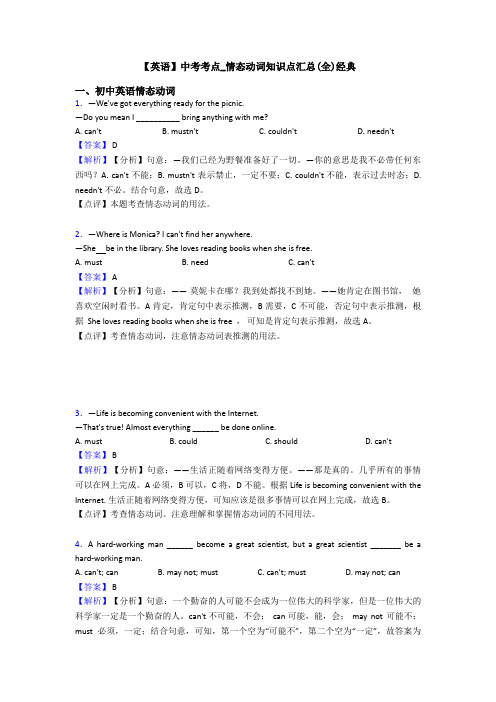
【英语】中考考点_情态动词知识点汇总(全)经典一、初中英语情态动词1.—We've got everything ready for the picnic.—Do you mean I __________ bring anything with me?A. can'tB. mustn'tC. couldn'tD. needn't【答案】 D【解析】【分析】句意:—我们已经为野餐准备好了一切。
—你的意思是我不必带任何东西吗?A. can't 不能;B. mustn't 表示禁止,一定不要;C. couldn't不能,表示过去时态;D. needn't不必。
结合句意,故选D。
【点评】本题考查情态动词的用法。
2.—Where is Monica? I can't find her anywhere.—She be in the library. She loves reading books when she is free.A. mustB. needC. can't【答案】 A【解析】【分析】句意:——莫妮卡在哪?我到处都找不到她。
——她肯定在图书馆,她喜欢空闲时看书。
A肯定,肯定句中表示推测,B需要,C不可能,否定句中表示推测,根据 She loves reading books when she is free ,可知是肯定句表示推测,故选A。
【点评】考查情态动词,注意情态动词表推测的用法。
3.—Life is becoming convenient with the Internet.—That's true! Almost everything ______ be done online.A. mustB. couldC. shouldD. can't【答案】 B【解析】【分析】句意:——生活正随着网络变得方便。
(完整版)初中情态动词用法总结

一情态动词的用法和辨析,情态动词表示推测和可能,由情态动词引导的一般疑问句的回答。
二 1 只是情态动词: can, could, may, might, must2 可做情态动词,可做实义动词: need, dare3 可做情态动词,可做助动词: will, would, shall, should4 特殊: have to, ought to, used to三 1 有一定的词义,但不能单独作谓语,必须与行为动词和系动词连用构成谓语。
2 无人称和数的变化。
( have to 除外)Eg: He has to stay here.3 后接动词原形。
4 具有助动词作用,可构成否定,疑问或简短回答。
四① 表示能力,“能,会”。
Eg : Can you play basketball?② 表示怀疑,猜测,常用于否定句或疑问句。
Eg :Li hua can’t be in the classroom.③ 表示请求,允许,多用于口语,译“可以”= may.Eg: youcangonow.④can 开头的疑问句,肯定句,否定句用 can 或 can’t.①can 的过去式,表示过去的能力。
Eg :I could swim when I was seven years old.②could 开头的疑问句,肯定和否定回答用 could, couldn’ t 如果 could 表示现在的委婉,用 can 回答。
Eg: Could I have a drink? Yes, you can.① 表示推测,“可能,也许”,用于肯定句。
Eg: He may come tomorrow.② 表示请求,“许可,可以”。
Eg: May I borrow your book?注:表示请求,许可时,主语为第一人称的一般疑问句,否定回答用 mustn’t“不可以,禁止,不许”,不用may not“可能不”。
③表示祝愿。
Eg :May you success.①表示“可以”,用于过去时中。
中考英语情态动词考点总结与归纳
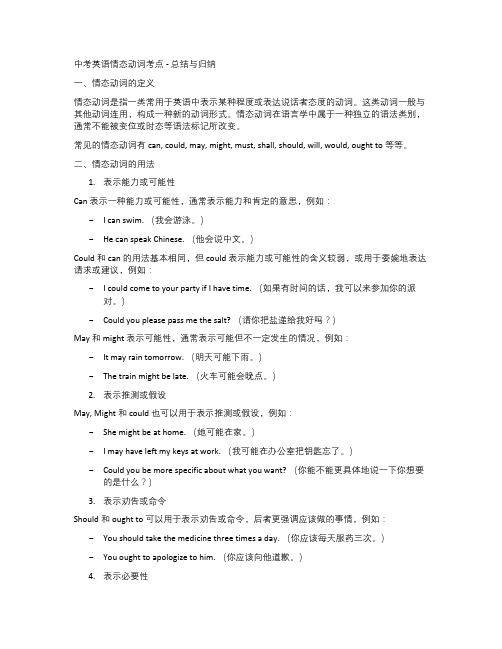
中考英语情态动词考点 - 总结与归纳一、情态动词的定义情态动词是指一类常用于英语中表示某种程度或表达说话者态度的动词。
这类动词一般与其他动词连用,构成一种新的动词形式。
情态动词在语言学中属于一种独立的语法类别,通常不能被变位或时态等语法标记所改变。
常见的情态动词有 can, could, may, might, must, shall, should, will, would, ought to 等等。
二、情态动词的用法1.表示能力或可能性Can 表示一种能力或可能性,通常表示能力和肯定的意思,例如:-I can swim. (我会游泳。
)-He can speak Chinese. (他会说中文。
)Could 和 can 的用法基本相同,但 could 表示能力或可能性的含义较弱,或用于委婉地表达请求或建议,例如:-I could come to your party if I have time. (如果有时间的话,我可以来参加你的派对。
)-Could you please pass me the salt? (请你把盐递给我好吗?)May 和 might 表示可能性,通常表示可能但不一定发生的情况,例如:-It may rain tomorrow. (明天可能下雨。
)-The train might be late. (火车可能会晚点。
)2.表示推测或假设May, Might 和 could 也可以用于表示推测或假设,例如:-She might be at home. (她可能在家。
)-I may have left my keys at work. (我可能在办公室把钥匙忘了。
)-Could you be more specific about what you want? (你能不能更具体地说一下你想要的是什么?)3.表示劝告或命令Should 和 ought to 可以用于表示劝告或命令,后者更强调应该做的事情,例如:-You should take the medicine three times a day. (你应该每天服药三次。
中考英语情态动词总结

中考英语情态动词总结情态动词是一类特殊的动词,表达了说话人的态度、意愿、能力、推测等情态。
常见的情态动词有can, could, may, might, must, shall, should, will, would, ought to等。
下面是关于这些情态动词的总结:1. can: 表示能力、许可。
常用于肯定句和疑问句中,一般不能用于否定句。
例如:"I can swim."(我会游泳。
)"Can you help me?"(你能帮我吗?)2. could: 表示过去的能力、许可,也可以用于请求或建议。
例如:"When I was young, I could run very fast."(我小时候跑得很快。
)"Could you please pass me the salt?"(你能帮我递一下盐吗?)4. might: 表示较小的可能性,常用于虚拟语气句中。
例如:"If it doesn't rain, we might go for a picnic."(如果不下雨,我们可能去野餐。
)5. must: 表示必须、推测的肯定。
例如:"You must finish your homework before you go out."(你必须在出去之前完成作业。
)"It's already 9 o'clock. He must be at home."(已经9点了,他一定在家。
)6. shall: 表示将来的意愿,用于第一人称(I, we)的疑问句中。
例如:"Shall we go to the park tomorrow?"(明天我们去公园吧?)7. should: 表示应该,常用于建议、请求中。
例如:"You should take a break."(你应该休息一下。
初中知识点归纳情态动词的情态与用法
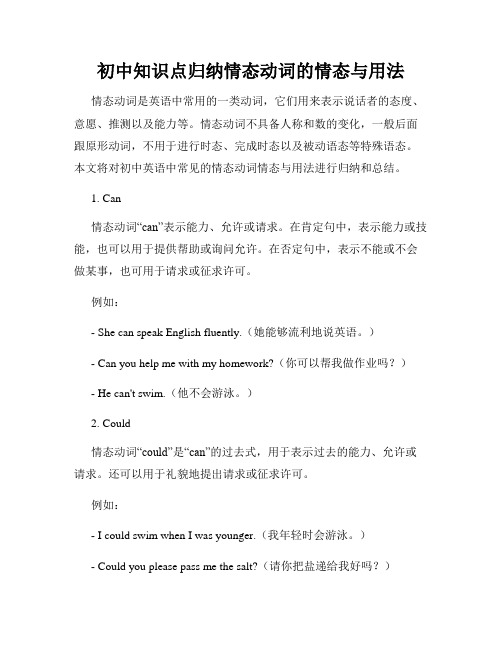
初中知识点归纳情态动词的情态与用法情态动词是英语中常用的一类动词,它们用来表示说话者的态度、意愿、推测以及能力等。
情态动词不具备人称和数的变化,一般后面跟原形动词,不用于进行时态、完成时态以及被动语态等特殊语态。
本文将对初中英语中常见的情态动词情态与用法进行归纳和总结。
1. Can情态动词“can”表示能力、允许或请求。
在肯定句中,表示能力或技能,也可以用于提供帮助或询问允许。
在否定句中,表示不能或不会做某事,也可用于请求或征求许可。
例如:- She can speak English fluently.(她能够流利地说英语。
)- Can you help me with my homework?(你可以帮我做作业吗?)- He can't swim.(他不会游泳。
)2. Could情态动词“could”是“can”的过去式,用于表示过去的能力、允许或请求。
还可以用于礼貌地提出请求或征求许可。
例如:- I could swim when I was younger.(我年轻时会游泳。
)- Could you please pass me the salt?(请你把盐递给我好吗?)3. May情态动词“may”用于表示许可、可能性、请求或建议。
在肯定句中,表示允许或可能发生的事情。
在否定句中,表示不允许或不可能发生的事情。
例如:- You may go now.(你可以走了。
)- May I use your phone?(我可以用一下你的手机吗?)4. Might情态动词“might”是“may”的过去式,用于表示过去的许可、可能性、请求或建议。
也可以表示较弱的可能性或不太有把握的情况。
例如:- He said I might borrow his car.(他说我可能可以借他的车。
)- I thought he might be at home, but he wasn't.(我以为他可能在家,但他不在。
中考考点_情态动词知识点汇总
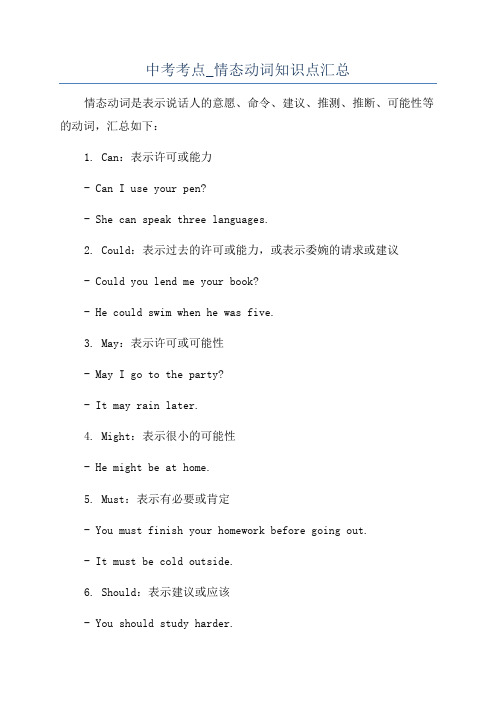
中考考点_情态动词知识点汇总情态动词是表示说话人的意愿、命令、建议、推测、推断、可能性等的动词,汇总如下:1. Can:表示许可或能力- Can I use your pen?- She can speak three languages.2. Could:表示过去的许可或能力,或表示委婉的请求或建议- Could you lend me your book?- He could swim when he was five.3. May:表示许可或可能性- May I go to the party?- It may rain later.4. Might:表示很小的可能性- He might be at home.5. Must:表示有必要或肯定- You must finish your homework before going out.- It must be cold outside.6. Should:表示建议或应该- You should study harder.7. Shall:表示征求意见或提出建议,或用于第一人称的疑问句中- Shall we go to the movies tonight?- What shall I do with this problem?8. Will:表示意愿、意愿、习惯或将来的行动- I will help you with your homework.- She will be here in a few minutes.9. Would:表示过去的意愿或习惯,或表示委婉的请求、邀请或建议- Would you like some tea?- He would always go for a walk after dinner.10. Ought to:表示应该,常用于表达责任或义务- You ought to apologize for what you did.这些是常见的情态动词,掌握它们的用法可以帮助你更准确地表达自己的意图和观点。
初中英语情态动词的讲解

初中英语情态动词的讲解情态动词是英语中的一类特殊动词,用于表示说话人的态度、推测、能力、许可等。
初中阶段研究英语时,情态动词是一个重要的语法知识点。
本文将对初中英语中常用的情态动词进行讲解。
1. CanCan 是一个情态动词,用于询问和表示能力、可能性、允许等。
是一个情态动词,用于询问和表示能力、可能性、允许等。
1.1 用法- 用于询问能力:Can 用于询问某人是否有能力做某事。
Can用于询问某人是否有能力做某事。
- Can you swim?(你会游泳吗?)- 用于表示可能性:Can 用于表示某事有可能发生。
Can用于表示某事有可能发生。
- It can rain tomorrow.(明天可能会下雨。
)- 用于征求允许:Can 用于请求允许做某事。
Can用于请求允许做某事。
- Can I borrow your pen?(我可以借用你的钢笔吗?)1.2 注意事项- 当 Can 用于疑问句时,其后的动词需用原形。
Can用于疑问句时,其后的动词需用原形。
- Can she play the guitar?(她会弹吉他吗?)2. MustMust 是一个情态动词,用于表示必须,义务和推测。
是一个情态动词,用于表示必须,义务和推测。
2.1 用法- 用于表示必须:Must 用于表示某事是必须的。
Must用于表示某事是必须的。
- You must finish your homework before watching TV.(你必须在看电视之前完成作业。
)- 用于表示义务:Must 用于表示某事是责任所在。
Must用于表示某事是责任所在。
- We must obey the rules.(我们必须遵守规则。
)- 用于表示推测:Must 用于表示一种较为确信的推测。
Must用于表示一种较为确信的推测。
- He must be tired after running for so long.(他跑了这么长时间,一定很累了。
完整word版初中英语语法专题 情态动词

初中英语语法专题情态动词一、【情态动词】又叫情态助动词。
它们具有以下特点:⑴它们必须与其他动词连用,即:情态动词+动词原形表示说话人对所述动作的看法,如需要、可能、意愿或怀疑等。
⑵绝大多数情态动词没有人称和数的变化,即第三人称单数不加-s(以be和have 开头的情态动词短语除外)。
⑶在意义上,情态动词具有“多义性”。
例:can既可表示能力,又可表示可能、允许等意义。
有can (could), may (might), must, have to, shall (should, will (would), dare (dared), need (needed), ought to等。
情态动词无人称和数的变化;不能单独使用,必须与其后的动词原形构成谓语。
^^can 表示能力,意为“能会”表示推测,意为“可能”,常用于否定句和疑问句中表示请求,允许,意为“可以”.^^could 是can 的过去式,意为“能、会”,表示过去的能力在疑问句中表示委婉请求 .^^may 表示请求、许可,意为“可以”表示推测,常用于肯定句中,意为“可能、也许”. ^^might 是may的过去式,表推测,常用于肯定句中,意为“可能、也许” .^^must 表示主观看法,意为“必须、应该”表有把握的推测,用语肯定句 .^^need \表示需要、必须,主要用于否定句和疑问句中 .^^dare 表示敢于,主要用于否定句和疑问句中.^^should 意为“应该”,表示要求和命令表示劝告、建议.^^had better 意为“最好”,表示建议.^^used to意为“过去常常,表示过去的动作、行为.部分情态动词的基本用法:考点一情态动词知识清单1. can的基本用法:⑴表示体力或智力上的能力,即“能够,会”,可与be able to转换。
例:He can speak English. = He is able to speak English.—Can you play basketball?— No, I can't.如果表示将来具备的能力,要用will be able to。
情态动词分类及用法简介

情态动词分类及用法简介
情态动词在英语语法中的分类主要包括以下几种:
1.推测情态:表示对未来或未知情况的推测,常用的情态动词有may,
might,could,shall等。
例如,“She may be late”,“It might rain tomorrow”。
2.义务情态:表示必须或应该做某事,常用的情态动词有must,should,
ought to等。
例如,“You must be careful”,“You should eat more vegetables”。
3.能力情态:表示具备做某事的能力或可能性,常用的情态动词有can,
could,be able to等。
例如,“I can swim”,“He will be able to walk soon”。
4.允许情态:表示允许或不被禁止做某事,常用的情态动词有may,can等。
例如,“You may leave now”,“Can I use your phone?”。
5.虚拟情态:表示与实际情况相反的情况或假设的情况,常用的情态动词有
should,would,might,could等。
例如,“If I should win the lottery,
I would buy a new car”。
6.必须情态:表示必须或应当做某事,常用的情态动词有must等。
例如,
“You must complete your homework”。
这些分类概括了情态动词在英语语法中的主要用法。
通过了解和掌握这些分类,可以帮助我们更好地理解和使用情态动词,从而提高我们的英语表达能力。
中考英语复习,必考的语法重点系列之情态动词用法归纳

中考英语复习,必考的语法重点系列之情态动词用法归纳情态动词是每年中考必考的考点之一,看似不难,但是从同学们得分情况看,其中的一些知识点还是很容易出错的。
今天我们就情态动词的用法及考点作详细归纳,只为帮助到更多有需要的同学们。
一、情态动词的基本用法情态动词本身是有意义的,通常表示说话人认为某事“可能、或许、应该”发生等。
它没有人称和数的变化,在句子当中不能单独作谓语,只能跟后面的动词一起构成谓语。
常考点之一:情态动词后接动词原形。
常见的情态动词主要有:以上这些情态动词,可以分成四类,分别是:只作情态动词(must,can/could,may/might,ought to );既是实义动词,又是情态动词(need,dare );既是助动词,又是情态动词(shall/should,will/would);具有情态动词特点词(have/had to,used to)。
情态动词记忆口诀:为了方便记忆和区分这些情态动词的意义和用法,大家可以利用下面的口诀。
情态动词表委婉,动词原形跟后面。
can“能力”may“许可”,must“责任”或“义务”;否答needn’t表“不必”;need“需要”,dare“敢”;should “应该”would“愿”,have to“被迫”因客观。
这里其中包含了考点must和 have to的用法区别以及needn’t用法。
具体用法下面将会讲到。
二、情态动词考点分析1、can和could的用法和考点1)表示能力或客观可能性,还可以表示请求和允许。
如:Can you come here tomorrow?考点注意:1)could表示请求,语气更委婉,主要用于疑问句,不可用于肯定句,答语应用can,也就是说现在时态的回答语不能用could。
如:Could I borrow this book from you?Yes,you can. (否定答语可用No/Sorry,I’m afraid not.)2)can表示能力时,还可用be able to代替。
初中英语知识点归纳情态动词的用法总结
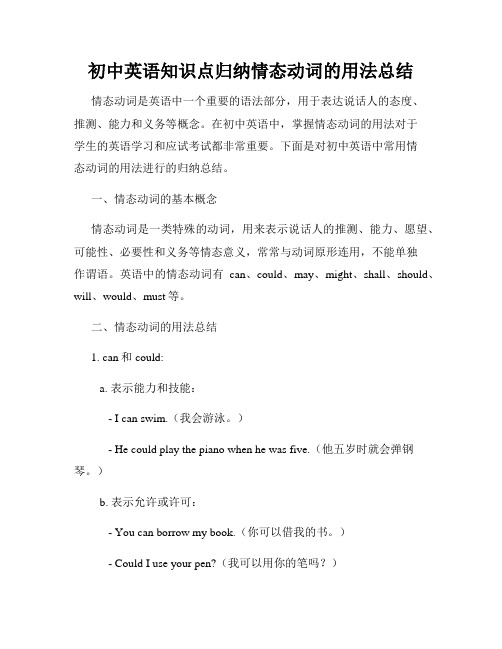
初中英语知识点归纳情态动词的用法总结情态动词是英语中一个重要的语法部分,用于表达说话人的态度、推测、能力和义务等概念。
在初中英语中,掌握情态动词的用法对于学生的英语学习和应试考试都非常重要。
下面是对初中英语中常用情态动词的用法进行的归纳总结。
一、情态动词的基本概念情态动词是一类特殊的动词,用来表示说话人的推测、能力、愿望、可能性、必要性和义务等情态意义,常常与动词原形连用,不能单独作谓语。
英语中的情态动词有can、could、may、might、shall、should、will、would、must等。
二、情态动词的用法总结1. can和could:a. 表示能力和技能:- I can swim.(我会游泳。
)- He could play the piano when he was five.(他五岁时就会弹钢琴。
)b. 表示允许或许可:- You can borrow my book.(你可以借我的书。
)- Could I use your pen?(我可以用你的笔吗?)c. 表示请求或邀请:- Can you help me with my homework?(你能帮我做功课吗?) - Could you please pass me the salt?(请你把盐递给我好吗?)2. may和might:a. 表示请求或允许:- May I go to the bathroom?(我可以去洗手间吗?)- You may not smoke here.(你不能在这里吸烟。
)b. 表示推测或可能性:- It may rain tomorrow.(明天可能会下雨。
)- He might be busy now.(他现在可能很忙。
)3. shall和should:a. 表示建议、命令或义务:- You shall listen to your parents.(你应该听父母的话。
)- We should take care of the environment.(我们应该保护环境。
13个情态动词表格归纳

情态动词归纳表格
一、情态动词含义
情态动词是一种表达可能性和必要性的动词,通常与助动词结合使用,用于表示说话人的意见、请求、询问或判断。
二、情态动词分类
情态动词可以分为以下几类:
1.现在时情态动词:can, may, shall, will, need, dare
2.过去时情态动词:could, might, should, would, used to
3.助动词情态动词:must, have to, ought to, dare (作为助动词)
4.半情态动词:need, dare (作为助动词)
5.习惯表达情态动词:used to
6.表示必要性的情态动词:should, ought to, had better
三、情态动词使用场景
情态动词的使用场景多种多样,可以用于表达请求、建议、疑问、可能性和必要性等。
例如,“Can you help me?”表示请求帮助;“You should eat more vegetables.”表示建议多吃蔬菜;“May I ask a question?”表示提问。
七年级情态动词知识点归纳

七年级情态动词知识点归纳在英语学习过程中,情态动词是一个重要的语法知识点。
在初中阶段,七年级学生需要掌握情态动词的用法和意义,以便在口语和书写中运用自如。
本文将对七年级情态动词知识点进行归纳,帮助学生更好地掌握这个难点知识。
一、情态动词的定义和分类情态动词是一类助动词,用于表示能力、意愿、推测、建议等语气和含义。
常见情态动词包括can, could, may, might, must, shall, should, will和would。
其中,can, could, may, might, must表示推测或能力,shall, should, will和would表示意愿或建议。
二、情态动词的用法1. 表示能力:can, could, may, might, must例句:I can play basketball very well. 我打篮球很好。
2. 表示推测:can, could, may, might例句:He can be a doctor in the future. 他将来可能成为一名医生。
3. 表示必须或应该:must, should例句:You must study hard if you want to pass the exam. 如果想要通过考试你必须很努力学习。
4. 表示意愿或建议:shall, should, will, would例句:We should help others whenever we can. 我们应该在能帮助别人的时候伸出援手。
三、情态动词的否定和疑问形式1. 否定形式:在情态动词后加not例句:I cannot speak English fluently. 我不会流利地说英语。
2. 疑问形式:将情态动词放在主语前即可例句:Can you swim? 你会游泳吗?四、情态动词的常见搭配1. can/could + 动词原形:表示能力例句:I can speak Chinese fluently. 我能流利地说中文。
《中考英语》初中英语语法知识—情态动词的分类汇编附解析
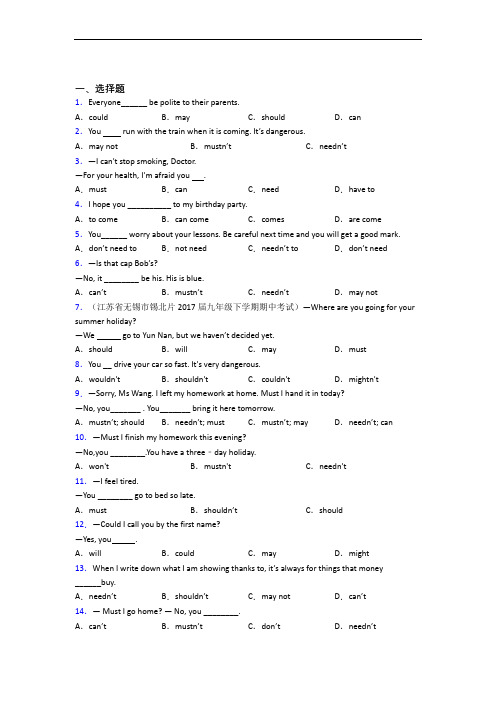
一、选择题1.Everyone______ be polite to their parents.A.could B.may C.should D.can2.You run with the train when it is coming. It’s dangerous.A.may not B.mustn’t C.needn’t3.―I can't stop smoking, Doctor.―For your health, I'm afraid you .A.must B.can C.need D.have to4.I hope you __________ to my birthday party.A.to come B.can come C.comes D.are come 5.You______ worry about your lessons. Be careful next time and you will get a good mark. A.don’t need to B.not need C.needn’t to D.don’t need 6.—Is that cap Bob’s?—No, it ________ be his. His is blue.A.can’t B.mustn’t C.needn’t D.may not7.(江苏省无锡市锡北片2017届九年级下学期期中考试)—Where are you going for your summer holiday?—We go to Yun Nan, but we haven’t decided yet.A.should B.will C.may D.must8.You __ drive your car so fast. It's very dangerous.A.wouldn't B.shouldn't C.couldn't D.mightn't 9.—Sorry, Ms Wang. I left my homework at home. Must I hand it in today?—No, you_______ . You_______ bring it here tomorrow.A.mustn’t; should B.ne edn’t; must C.mustn’t; may D.needn’t; can 10.—Must I finish my homework this evening?—No,you ________.You have a three﹣day holiday.A.won't B.mustn't C.needn't11.—I feel tired.—You ________ go to bed so late.A.must B.shouldn’t C.should12.—Could I call you by the first name?—Yes, you .A.will B.could C.may D.might 13.When I write down what I am showing thanks to, it’s always for things that money______buy.A.needn’t B.shouldn’t C.may not D.can’t14.— Must I go home? — No, you ________.A.ca n’t B.mustn’t C.don’t D.needn’t15.---I heard they went skating in the mountains last winter.---It ______ true because there was little snow there.A.may not be B.won’t be C.couldn’t be D.will be 16.—The food ________be delicious . You ate it up .—You bet . My mum cooked it for me .A.must B.may C.can D.need 17.(2017 • 湖北省宜昌市中考)—Life is becoming convenient with the Internet.—That’s true! Almost everything be done online.A.must B.would C.should D.can 18.—Must I sleep now? —No, you________.A.needn't B.mustn't C.can't D.may not 19.—We've prepared all kinds of foods for the picnic.—Do you mean I___ bring anything?A.can't B.needn't C.mustn't D.won't20.---You look very pretty, if I say so.---Thanks a lot for saying that.A.must B.may C.will D.have to 21.Even the top student can't work out this problem, so it________ be too difficult. A.must B.may C.can D.need 22.—Jenny, we buy Mom presents. We can clean the house from top to bottom.—Good idea! It’s a special present for Mother’s D ay.A.can’t B.mustn’tC.shouldn’t D.needn’t【参考答案】***试卷处理标记,请不要删除一、选择题1.C解析:C【解析】句意:每个人都应该对父母有礼貌。
初中情态动词知识点归纳

初中情态动词知识点归纳1.情态动词的定义:情态动词是一类特殊的助动词,用来表示说话者对其中一种动作或状态的态度、意愿、能力、推测等。
2.情态动词的特点:a.情态动词本身没有人称和数的变化;b.后面一般不加动词的“s”形式;c.后面直接接动词原形。
3.情态动词的用法:a. 表示能力和可能性:can,could,may,might,shall,should,will,would;b. 表示命令和建议:shall,should,ought to,must;c. 表示义务和必须:must,should,ought to;d. 表示推测和可能性:may,might,could;e. 表示许可和禁止:may,can,mustn't,shouldn't;f. 表示愿望和要求:would like,would rather,should;g. 表示意愿和决心:will,would;h. 表示猜测和推测:could,might。
4.情态动词的否定形式:a. 在情态动词之后加not,构成否定形式,例如:can not,could not,may not,might not,shall not,should not,will not,would not等;b. 能力和意愿的否定形式:cannot,could not,may not,might not,will not,would not。
5.情态动词的疑问形式:b. 以情态动词开头的特殊疑问句:疑问词+情态动词+主语+动词原形,例如:What can she do? Where should we go? Who could help me?6.情态动词的省略:a.在与已知的情况一致时,情态动词可以省略;b. 在直接接不定式的情态动词后,可以省略to。
7.典型的情态动词搭配:a. can/could: 表示能力和可能性,例如:I can swim. He could play the piano when he was young.c. must: 表示推测和肯定,例如:She must be at home. You must be tired after such a long journey.d. should: 表示建议和应该,例如:You should study hard. She should go to bed early.e. will/would: 表示意愿和将要,例如:I will help you. He would like to go to the park.以上是初中情态动词的知识点归纳。
最新中考考点_情态动词知识点汇总
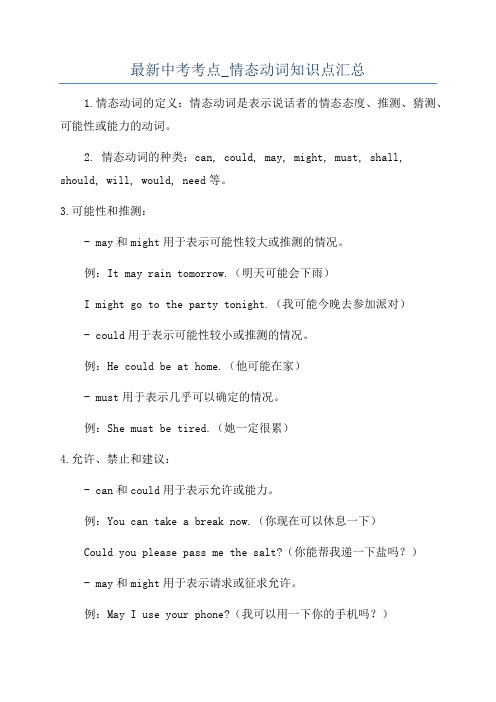
最新中考考点_情态动词知识点汇总1.情态动词的定义:情态动词是表示说话者的情态态度、推测、猜测、可能性或能力的动词。
2. 情态动词的种类:can, could, may, might, must, shall, should, will, would, need等。
3.可能性和推测:- may和might用于表示可能性较大或推测的情况。
例:It may rain tomorrow.(明天可能会下雨)I might go to the party tonight.(我可能今晚去参加派对)- could用于表示可能性较小或推测的情况。
例:He could be at home.(他可能在家)- must用于表示几乎可以确定的情况。
例:She must be tired.(她一定很累)4.允许、禁止和建议:- can和could用于表示允许或能力。
例:You can take a break now.(你现在可以休息一下)Could you please pass me the salt?(你能帮我递一下盐吗?)- may和might用于表示请求或征求允许。
例:May I use your phone?(我可以用一下你的手机吗?)- must用于表示禁止。
例:You must not smoke in this area.(在这个区域禁止吸烟)- should用于表示建议。
例:You should eat more vegetables.(你应该多吃蔬菜)5.能力和可能性:- can和could用于表示能力。
例:I can swim.(我会游泳)He could run fast when he was young.(他年轻的时候跑得很快)- must用于表示推测和可能性。
例:It must be cold outside.(外面一定很冷)6.须要:- need用于表示需要或必要。
例:I need to finish my homework.(我需要完成作业)7.情态动词的用法:-情态动词后面接动词原形。
- 1、下载文档前请自行甄别文档内容的完整性,平台不提供额外的编辑、内容补充、找答案等附加服务。
- 2、"仅部分预览"的文档,不可在线预览部分如存在完整性等问题,可反馈申请退款(可完整预览的文档不适用该条件!)。
- 3、如文档侵犯您的权益,请联系客服反馈,我们会尽快为您处理(人工客服工作时间:9:00-18:30)。
一、选择题1.One ______ easily lose his way when he visits or comes to a new place.A.may B.must C.need D.should2.-Listen! A wolf is crying!-It _______ be a wolf, because a wolf never comes out at this time.A.mustn’t B.needn’t C.can’t D.don’t3.You have finished most of the work, so you ____ start working so early tomorrow. You may come at 9 :00.A.can't B.mustn't C.needn't D.couldn't4.A: Is Jim coming by train?B: I’m not sure. He _______ drive his car.A.must B.may C.need D.should 5.—Can I take some milk and biscuits to the reading room?—No, our school has a rule that students _______ eat or drink there.A.can’t B.mustn’t C.needn’t D.may not6.(江苏省无锡市锡北片2017届九年级下学期期中考试)—Where are you going for your summer holiday?—We go to Yun Nan, but we h aven’t decided yet.A.should B.will C.may D.must 7.—Tom, we’re going shopping at eight, right?—Yeah, but I ______ be a little late, so don’t wait for me.A.may B.should C.mustn’t8.You should________ the teacher________being late for school.A.apology to, about B.apologize to, forC.apologies to, for D.apologize to, on9.I see the blackboard. I need to have my glasses.A.can B.can’t C.must D.mustn’t 10.—I’d like ________ Guo Jingming’s Tiny Times.—You had better________ his books. The stories he tells are far from real life.A.buying, don’t read B.to buy, not readC.buying, not read D.to buy, not to read11.—Look! Mrs. Smith is standing in front of the teaching building.—It______ her. She has gone to Egypt for her holiday.A.must be B.mustn’t be C.can be D.can’t be12.I’m sorry, children over 1.4 meters________pay the full price for the show.A.may B.must C.can D.ought to 13.We _______ keep the new traffic law and learn how to protect ourselves.A.may B.should C.can D.need14.— May I have some wine?— No, you . You have to drive home later.A.shouldn't B.needn't C.mustn't D.may not 15.Since the road is muddy,it ________last night, ________?A.must be rained; wasn’t it B.must have rained; didn’t itC.must rained; didn’t it D.must have rained; wasn’t it 16.Everyone______ be polite to their parents.A.could B.may C.should D.can 17.—Mum, I’ve signed for a big box by Future Express (快递). What’s in it?—I’m not sure. It ________be a present from your brother.A.need B.must C.may D.will 18.(2017 • 湖北省宜昌市中考)—Life is becoming convenient with the Internet.—That’s true! Almost everything be done online.A.must B.would C.should D.can19.—Is Wilson on duty in class today?—It________be him. It's his turn tomorrow.A.must B.can't C.should D.needn't 20.—________ David be the new chairperson of the Students’ Union?—He _______ be, but I’m not sure.A.Can; can’t B.Can; mayC.May; must D.May; mustn’t21.— Could you play the piano when you were 8 years old?— ________.A.Yes, I could B.No, I can’t C.Yes, I can D.No, I won’t 22.He like coffee. I see him drink a cup at times.A.must B.may C.can’t D.mustn’t【参考答案】***试卷处理标记,请不要删除一、选择题1.A解析:A【解析】【分析】【详解】句意:当一个人参观或来到一个新地方时可能很容易迷路。
考查情态动词的用法A. may可能;B. must必须;C. need需要;D. should应该。
根据句意及语境此题是可能迷路,表示可能性。
故选A。
2.C解析:C【解析】【详解】句意:--听! 狼在叫! --它不可能是狼,因为狼从来不会在这个时候出来。
A. mustn’t禁止;B. needn’t没有必要;C. can’t不可能;D. don’t构成一般现在时的否定句。
根据“because a wolf never comes out at this time因为狼从来不会在这个时候出来”,可推断它不可能是狼,故选C。
【点睛】情态动词表推测的用法:can表示“可能”;can’t表示“不可能”;may表示“可能”,must表示“一定”,注意mustn’t表示“禁止”不表示推测,表示否定推测要用can’t.3.C解析:C【解析】【详解】句意:你已经完成了大部分工作,所以你明天不必这么早就开始工作。
你可以9点来。
本题考查情态动词。
can't不可能,mustn’t禁止,needn’t不必,couldn’t可能不。
根据You have finished most of the work可知,你已经完成了大部分工作,因此明天不必这么早就开始工作,因此用needn’t,故选C。
4.B解析:B【解析】【详解】句意:——吉姆坐火车来吗?——我不确定,他可能开自己的车。
考查情态动词辨析。
A项,必须,一定,表示肯定推测;B项,也许,表示有可能;C项,需要;D项,应该。
根据回答部分I’m not sure.可知,此处并不确定吉姆是开车来还是乘坐火车来,所以此处是“可能”。
故选B。
【点睛】must意为“必须,应该”,可以表示主观上一定要做什么或者肯定推测。
例如:I must go home to look after my mum. This pair of shoes must be hers. may意为“可以,也许”,可以表示请求或者推测(无法断定)。
例如:May I come in? It may be hers,but I’m not sure. need意为“需要”,既是情态动词也是行为动词。
例如:You needn’t finish your homework right now. You need to tell him the truth. should意为“应该”,表示责任或者义务。
例如:You should finish practising playing the piano at first.5.B解析:B【解析】【详解】句意:——我能带些牛奶和饼干到阅览室吗?——不行,我们学校规定学生不许在那里食用食物。
考查情态动词的用法。
can’t不能;mustn’t禁止,不许;needn’t不必;may not可能不。
由“a rule”可知,“学校禁止或不许学生在阅览室食用食物”。
故选B。
6.C解析:C【解析】句意:——你暑假打算去哪儿?——我可能去云南,但是我还没有决定。
A. should应该;B. will打算,将;C. may可能;D. must必须。
这里是表示推测。
根据下文“但是我还没有决定”可知上文是“我可能去云南”,结合选项可知选C。
7.A解析:A【解析】【详解】句意:——Tom,我们8点将会去购物,对么?——是的,但是我可能会晚一点,所以不要等我。
考查情态动词词义辨析。
A. may可能;B. should应该;C. mustn’t禁止。
根据句意可知是可能会晚到。
